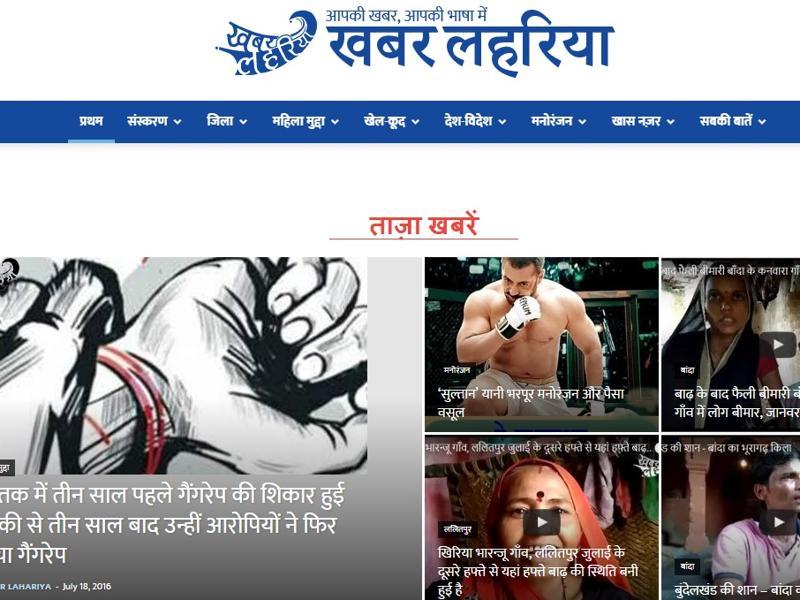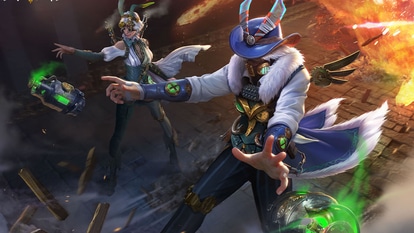Khabar Lahariya: Turning badlands of Bundelkhand into hub of journalism
Inspired by the iconic Vice Media, the digital content of Chambal Media has already created ripples in some rural quarters of Bundelkhand

The team of women journalists who turned the badlands of Bundelkhand into a hub of rural journalism with the launch of an eight-page newspaper "Khabar Lahariya" 15 years ago has now completed a six-month pilot-run of Chambal Media, a rural digital media start-up that banks on a "feminist business model" for its success.
"It was started in response to the increasing penetration of internet and smartphones in rural Uttar Pradesh, and the lack of good quality, independent digital media available for rural audiences who are accessing internet and social media on their phones," said Shalini Joshi, co-founder and CEO.
Chambal Media has partnership with Khabar Lahariya to distribute and market its digital content.
"This is a huge opportunity for a rural media company, as well as to expand the brand Khabar Lahariya, which has been working to bring women into media for 15 years," Shalini said.
Disha Mullick and Kavita are the other two co-founders of the company that will follow in the footsteps of the eight-page weekly whose core principle is "apni Khabar, apni bhasha mein" (your news in your native language).
Since the inception of the newspaper project in 2002, the production and marketing of Khabar Lahariya has been dependent on a cohort of female journalists who are mostly recruited from the rural communities where the newspaper is produced and circulated.
"Chambal Media aims to enable a local authentic voice of journalism to reach the largest possible audience. We will continue to distribute news generated by women, and especially from marginalised communities like Dalits, Muslims and adivasis," Disha said.
"Chambal's organisation structure too will continue to have a unique, rural-urban staff profile of predominantly women," she noted.
"We see a feminist business model as one where profitability can be achieved while holding close to the values of independent, progressive rural news; and by a team and organisational culture that is democratic, transparent and inclusive of women from diverse socio-economic backgrounds," Shalini explained.
Inspired by the iconic Vice Media, the digital content of Chambal Media has already created ripples in some rural quarters of Bundelkhand.
For example, a video feature story about Narad -- a young boy from Tindwari in Banda district who made a helicopter from a motorcycle engine, and was arrested by the local police -- was watched by over 13,000 viewers on Facebook, in a district with 16,000 people accessing Facebook on 3G internet.
"This is just one of a successful six-month pilot run of video news content, podcasts and memes which has taken Khabar Lahariya's local outreach to 50,000 viewers a week," Disha said.
"Our digital outreach in six months has overtaken the audience we are able to reach through print, especially a young audience. And to this audience, we are able to provide stories that other local media is unable to," Kavita added.
"With the growth of internet in rural areas, reaching the least likely consumer, for example the young rural girl, is a massive and exciting opportunity. I think it will bring hundreds of women into journalism from the villages and kasbahs of the country, as producers and consumers, but also as shareholders in a business that could take the media world by storm," Kavita said.
And inspired by the initial response, the Chambal Media team has now set their sights high.
"In three years Chambal hopes to expand to 80 districts across the Hindi belt, and from there across India and the Global South. We see this as a pioneering model in local media production and a way for independent media across the world to grow and sustain itself," Shalini said.
"Our business/revenue model involves a creative diversity of revenue streams, including advertisements, content licensing, events, consumer insights into rural markets and so on," she added.
As of now typing the word "Chambal" in Google may show you a Wikipedia page on Daku Man Singh "credited" with 1,112 robberies and 185 murders at the top, but with Chambal Media gaining traction, who knows, the results may change. The tales of bandits may one day be replaced by the stories of Narads.
Catch all the Latest Tech News, Mobile News, Laptop News, Gaming news, Wearables News , How To News, also keep up with us on Whatsapp channel,Twitter, Facebook, Google News, and Instagram. For our latest videos, subscribe to our YouTube channel.


























